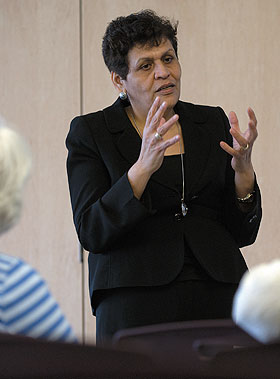  |
| HOME | THIS ISSUE | CALENDAR | GRANTS | BACK ISSUES | < BACK | NEXT > |
Special strategies needed to prevent HIV among women, speaker says by Beth Krane - March 31, 2008 | ||||
| Traditional methods of preventing HIV/AIDS often do not work for women because they put women at increased risk of violence, according to Nabila El-Bassel, a professor of social work and public health at Columbia University. El-Bassel, who has spent almost two decades designing and testing HIV prevention strategies in clinical trials for women, men, and couples, gave a talk at UConn on March 20 to mark the third annual Women and Girls’ HIV/ AIDS Awareness Day. Her lecture was titled, “Risk Factors and Gender-based Approaches to HIV Prevention.” HIV prevention efforts tend to focus primarily on three areas, El-Bassel said: negotiating safer sex, consistently using condoms, and being in a mutually monogamous relationship. “We know that these tactics can increase the risk of violence to women and that one HIV prevention strategy does not fit all women’s needs,” she said. A 2005 World Health Organization (WHO) report found that women in abusive relationships are less likely to ask their partners to use condoms because they are more likely to be abused if they do so, she said. The WHO report also found that men at high risk of transmitting HIV, such as those with more than one partner, those using drugs, and those with HIV or another sexually transmitted disease, are more likely to abuse a female partner who asks them to use a condom. Many of the women considered at high risk of contracting HIV have co-occurring issues, such as a history of childhood sexual abuse and related post traumatic stress disorder, El-Bassel said. These issues can lead to poor coping skills and a reliance on drugs, which, in turn, increase a woman’s likelihood of becoming the victim of sexual violence. Often, drug-using women are financially dependent on their partner. If they live on the street, they need their partner’s protection and are less likely to ask him to use a condom. Disputes over drugs also can be a major cause of sexual violence, El-Bassel said. Drug-using women’s HIV risk is compounded because few have the services they need to leave violent relationships. In New York City, for instance, there is only one women’s shelter that accepts women with a history of drug abuse, she said. El-Bassel shared a study she conducted with the Social Intervention Group, the multidisciplinary HIV and drug abuse research center she directs, that focused on abused women who used drugs and were practicing unprotected sex.
The intervention was unusual, El-Bassel said, because it didn’t start by introducing traditional HIV prevention tactics. Instead, the researchers first made referrals to needed social services. They also focused on safety planning at every single session, taught coping skills, and discussed how to create boundaries in relationships, El-Bassel said. “Women don’t really sit and think about the links between their history of childhood sexual abuse, their post-traumatic stress disorder, and the behaviors that put them at risk for HIV,” she said. “But it’s easy for them to make the connections once they have the opportunity.” The subjects in the study’s intervention group reported fewer unprotected sexual encounters, less drug use, less physical and sexual abuse, and a lessening of symptoms of post-traumatic stress disorder, she said. “This may be controversial, but I do not think the intervention would have worked without addressing the women’s co-occurring problems and without an emphasis on case management and safety planning,” El-Bassel said. In addition to the Social Intervention Group, El-Bassel also directs the recently established Columbia University Global Health Research Center based in Kazakhstan, and the National Institute of Mental Health’s HIV training program for racial and ethnic minority researchers. The talk was sponsored by the Women’s Center and the Southeastern HIV/AIDS Research and Evaluation (SHARE) Project at the Center for Health, Intervention, and Prevention (CHIP). The SHARE Project is directed by Seth Kalichman, a professor of social psychology. SHARE conducts behavioral HIV risk reduction research in Atlanta and South Africa. The research is funded by NIMH and the National Institute for Alcohol Abuse and Alcoholism. |
| ADVANCE HOME UCONN HOME |

